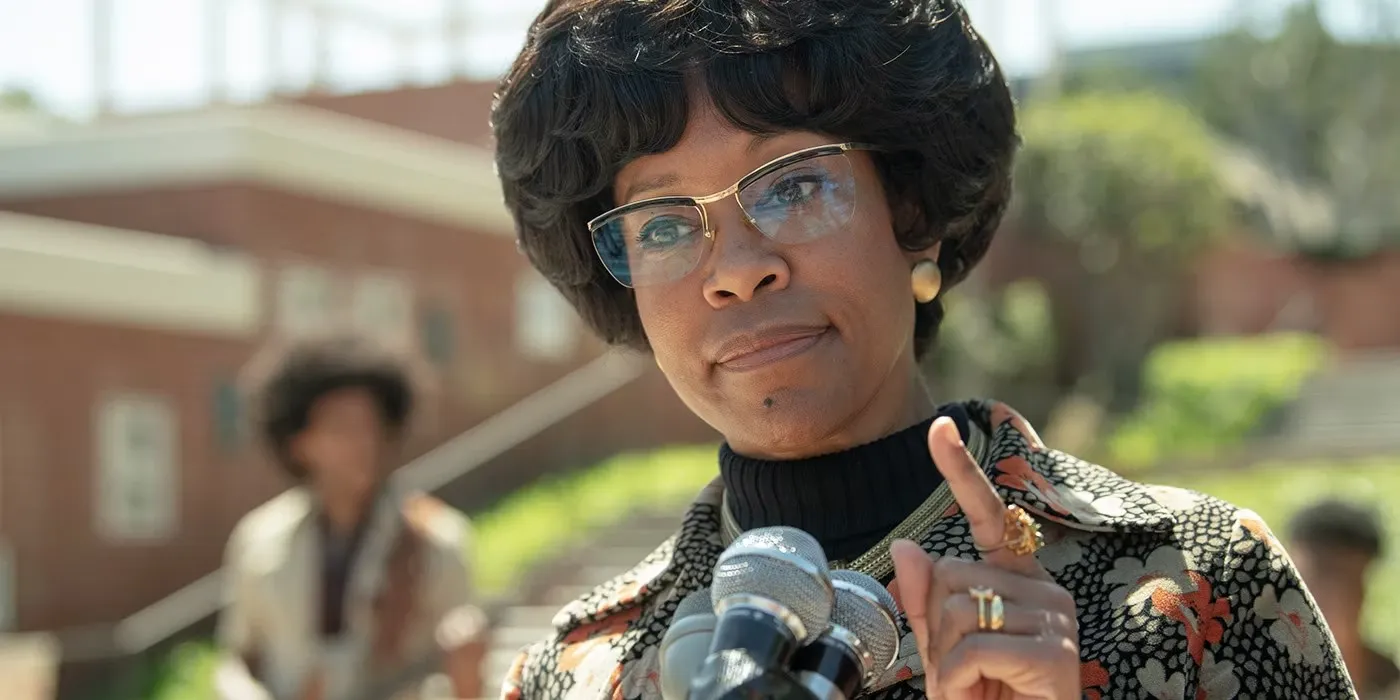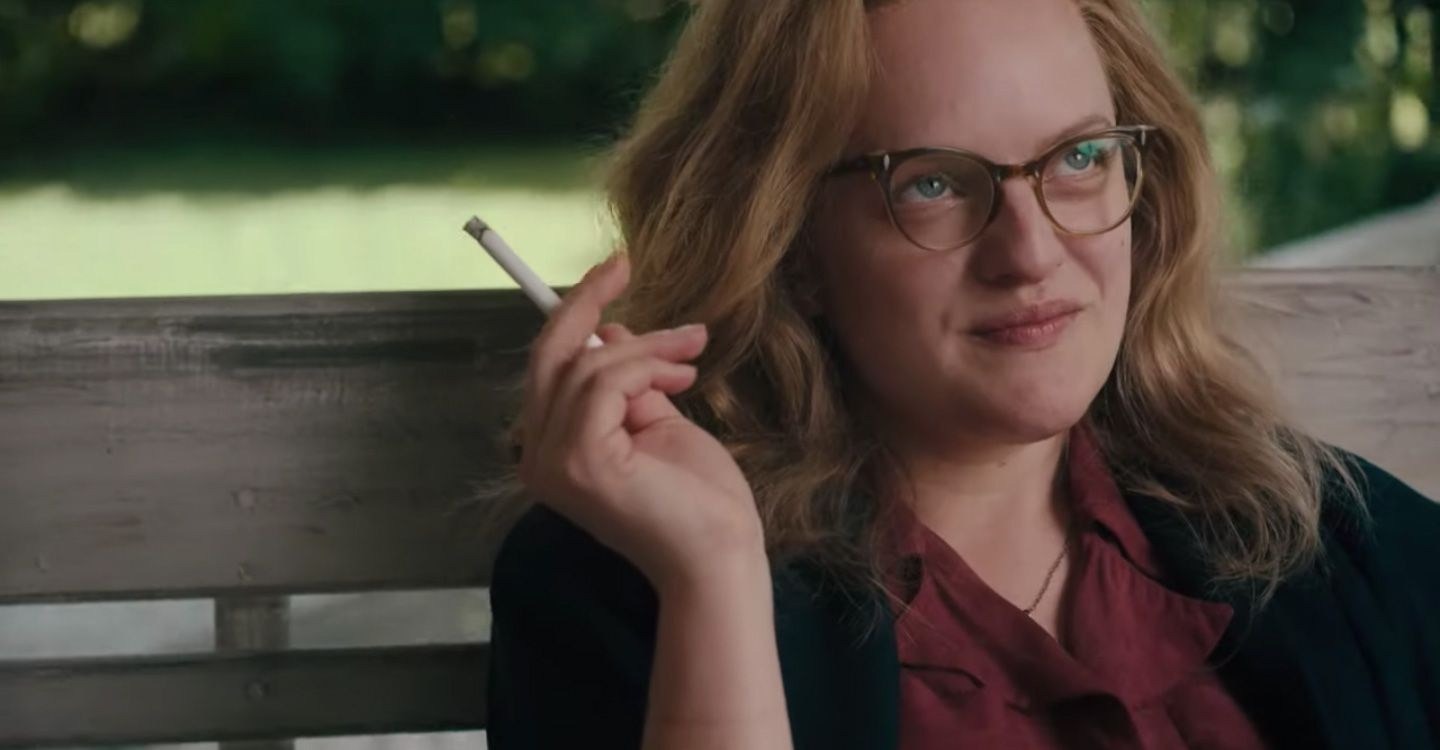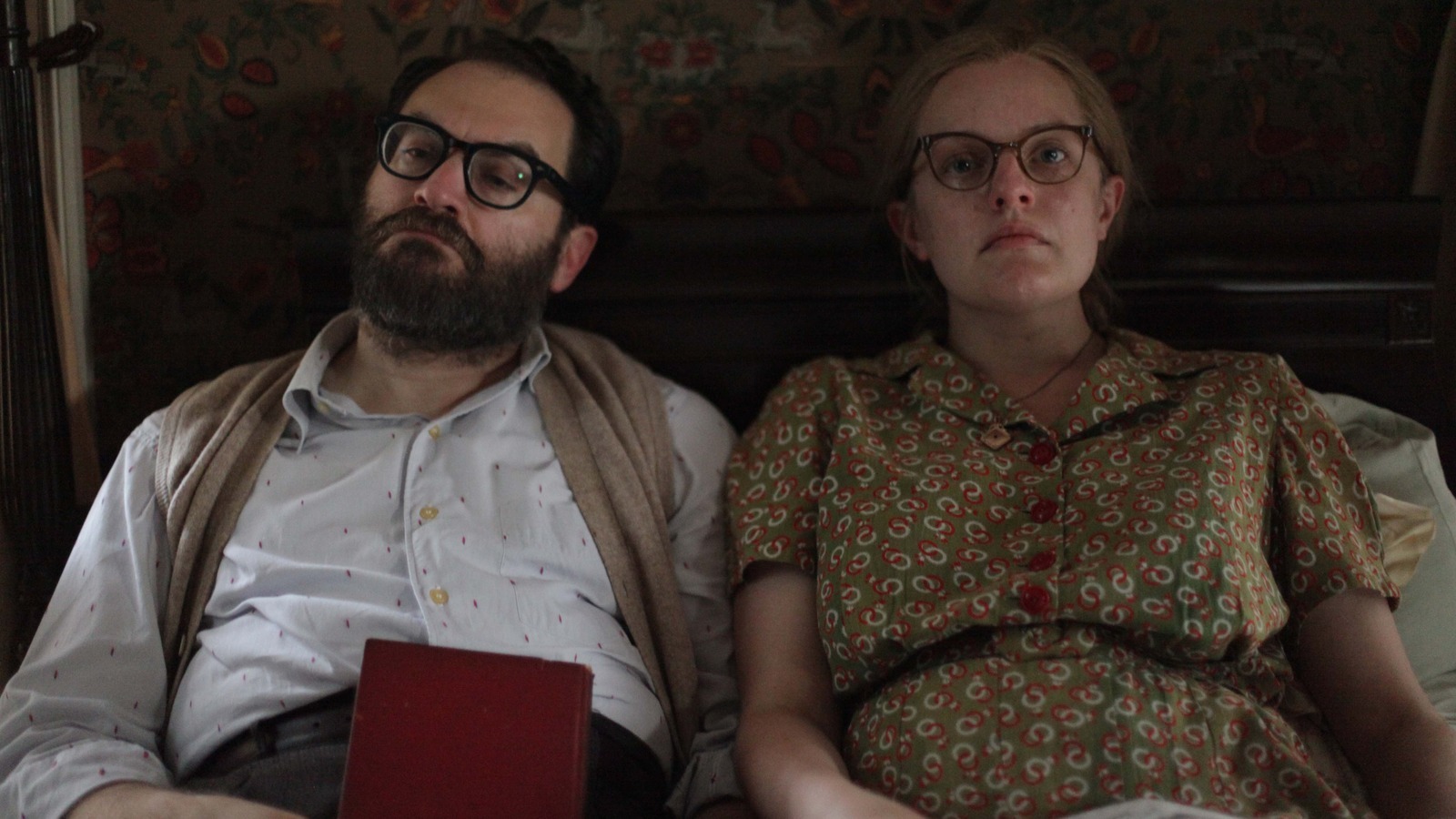Rather than beginning with the usual introduction to Josephine Decker’s 2020 film, it is more fitting to say that Shirley draws inspiration from Susan Scarf Merrell’s novel and presents a loose biography of the famous — and infamously prickly — horror writer Shirley Jackson.
Elisabeth Moss delivers an outstanding portrayal of Jackson, bringing to life a woman clearly at odds with the conservative, male-dominated norms of “proper society.” When another housewife fusses over a potential wine stain on her sofa, Jackson defiantly empties her glass onto it. Her character comes across as irritable, sluggish, fond of alcohol, and unapologetically harsh.

The Storyline of “Shirley”
At the centre of Shirley lies the complicated bond between Jackson and Rose Namser (Odessa Young), a cheerful college student who is blissfully in love with her husband and eagerly awaiting her first child. Unlike Jackson, who has no children and battles hidden sorrow over it, Rose represents hopefulness.
Jackson’s marriage to Stanley Edgar Hyman (Michael Stuhlbarg) seems functional — he admires her talents greatly. However, their relationship hints at being open, as Stanley engages in affairs without serious objections from Jackson. Rose’s marriage to Fred (Logan Lerman) reflects the clean-cut ideals of the 1950s, starkly contrasting Jackson’s chaotic life.
It must be said that Rose is purely fictional. Shirley Jackson never took in a student lodger, nor is there evidence she ever harboured resentment toward an optimistic young woman.
Interestingly, Jackson’s story is largely seen through Rose’s eyes, adding a skewed tint to the events. Even stranger, the film focuses heavily on Jackson’s perceived sorrow over childlessness, despite Jackson having children during the period portrayed.
The movie leans heavily into fictional elements, and its closing moments serve to drive home emotional themes that never genuinely applied to Jackson’s life.
Important Plot Details You Should Know About Shirley
Shirley revolves around jealousy, bitterness, and the restrictive academic atmosphere of 1950s America, which stifled both women and intellectual growth. Rose, excited about starting her domestic life, moves into Shirley’s home along with Fred, who has secured a teaching post at Bennington College.
Jackson, already a well-known figure due to her short story “The Lottery,” is anything but a demure housewife. She deliberately unsettles her new guest with mentions of witchcraft.
Her deep fear of the outside world, which mirrors the real Jackson’s struggles, has made her increasingly wild in isolation. Although Rose admires Jackson, she is also frightened by her intimidating nature.
On the other hand, Hyman adopts some of his wife’s more manipulative habits, making efforts to discourage Fred’s academic ambitions. His hostility seems partly rooted in Shirley’s own contempt toward the young couple and society as a whole.
Jackson’s anger grows when she discovers Rose’s pregnancy, sparking more tension. Despite the brewing animosity, there exists a strong, partly sexual pull between the two women — though historical records do not suggest Jackson ever identified as queer.
Adding another layer to the drama is the real-life mystery surrounding Paula Jean Welden’s 1946 disappearance, which influenced Jackson’s novel Hangsaman. Within the film, Rose begins suspecting that Hyman might have had some connection to Paula’s fate.
What Took Place after Shirley?
Toward the movie’s end, Rose begins mirroring Jackson’s attitude. After giving birth, she suspects Fred might be pursuing other women, much like Stanley did. Within the film’s depiction of 1950s society, women are expected to serve domestic roles while men freely indulge.
Jackson shows how cynicism becomes a weapon against this unfair structure, and Rose slowly embraces the same survival tactics. At one point, she almost follows Paula’s tragic path, walking into the woods as if consumed by despair.
However, inspired by Jackson’s hardened resilience, she decides to fight back against the societal pressures. Fierce determination and bitterness become her shield.
The story closes with Shirley and Stanley dancing together at home after she finishes writing Hangsaman. Their odd but steady life carries on.
Josephine Decker’s Reflections on the Ending of Shirley
Josephine Decker has made it very clear through interviews that her film was never meant to be a strict recounting of Shirley Jackson’s life. Speaking to Deadline in 2020, she explained:
“We never set out to make a factual biography. In fact, the script mashed together different parts of Jackson’s timeline, so it was always a work of fiction.
None of the events depicted could have truly happened based on how time worked in reality. We openly embraced the fact that we were inventing a fictional character, which allowed us greater creative freedom.”
The Jackson portrayed in Shirley serves more as a symbol of feminist defiance rather than a historical figure.
What Shirley Jackson’s Son Had to Say
Perhaps the boldest change Decker made involved portraying Jackson’s bitterness toward Rose due to her pregnancy. Jackson’s distaste for the expectations placed upon women in the 1950s is fierce in the film, with Moss channelling raw fury throughout every scene.
Shirley lashes out at dinner guests and behaves almost like one of her fictional characters. Decker’s vision creates a modern feminist statement, allowing contemporary frustrations to disrupt historical restrictions on women. Themes like bisexual attraction and rejection of motherhood are woven into the fictional Jackson.
However, this portrayal confused Shirley’s real-life son, Laurence Jackson Hyman. In an interview with the Press Democrat, Laurence pointed out that his mother, who had four children, never harboured the kind of anger depicted in the movie:
“The screenwriter and director tried to shape a Shirley Jackson who resembled one of her own characters. But my mother would never have openly insulted guests at the dinner table like that. She was quite proper. There are just enough real details to mislead viewers into thinking it’s a true biopic, but it veers heavily into fiction.”
Though Shirley’s reputation rests on chilling tales such as The Lottery and The Haunting of Hill House, her personality was said to be much warmer and far more humorous than the film suggests.
It is worth mentioning that Laurence was offered a consulting role on the film but chose to decline.
Thoughts From the Cast and Crew on Shirley’s Ending
The choice to fictionalise Jackson’s life traces back to the Susan Scarf Merrell novel that served as the film’s foundation. Rose, who never existed, was created for the novel.

In interviews, Merrell mentioned her hope that, despite being historical fiction, her book could still offer an authentic representation of Jackson’s spirit. Speaking with Fiction Writer’s Review, she said:
“I cannot deny being someone who invents stories. After spending eight months researching for a proper biography, I instead found myself writing about my journey in trying to answer the questions Shirley Jackson’s work provokes in many women about balancing life and writing. That didn’t quite satisfy either. Eventually, I aimed to use what I had discovered to craft what could best be described as an homage.”
Merrell found herself so influenced by Jackson’s writing style that even her biography veered into fiction. She also noted that Rose served as a vital key to unlocking her depiction of Jackson. In Merrell’s version, the bond between Jackson and Rose remained friendly, platonic, and did not hint at any romantic tension.
Historically, Shirley Jackson was indeed interested in witchcraft, sceptical of organised religion, and passionately feminist. Nonetheless, the bitter, combative persona depicted in Shirley does not truly align with the woman described by factual biographies, who portray her as more compassionate and good-natured.



